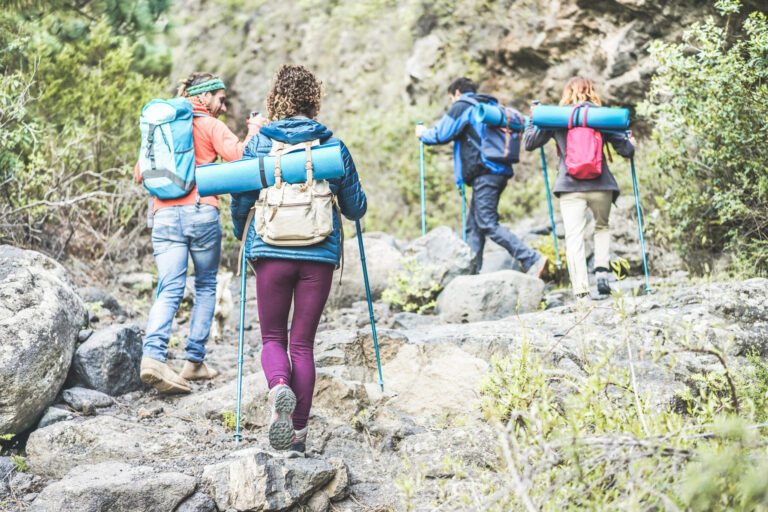The Science of Hiking: How Nature Walks Rewire Your Brain
Discover The Science of Hiking: Unlock the neurological benefits of nature walks and outdoor exercise for a healthier brain.
Hiking is more than just a recreational activity; it’s a powerful way to transform your brain health through a unique combination of physical exercise and nature immersion. With nearly 60 million Americans participating, hiking is one of the country’s most popular outdoor activities, offering scientifically proven benefits for neurological health.

Research shows that hiking creates changes in the brain that other forms of exercise cannot replicate. By combining physical exertion with cognitive challenges and nature exposure, hiking promotes neuroplasticity and improves overall health. This article will explore the benefits of hiking on the mind, from stress reduction and improved cognitive function to enhanced mood and social connection.
The Unique Power of Hiking for Brain Health
As a form of exercise, hiking stands out for its comprehensive benefits to both body and brain. Hiking can occur in various settings, from urban parks to mountain trails, providing an accessible way to improve physical health and mental well-being.
Beyond Ordinary Exercise: What Makes Hiking Special
Hiking engages multiple physiological systems simultaneously, making it a unique and effective way to enhance brain health. By activating the cardiovascular, musculoskeletal, and balance systems, hiking provides a comprehensive workout that benefits the brain through various pathways. According to research, activities like hiking that combine multiple physical demands create more comprehensive neurological benefits than single-focus exercises like running or weight training alone. For more information on the benefits of hiking, visit National Geographic.
The Three-in-One Workout: Cardio, Balance, and Strength
The multifaceted nature of hiking makes it an ideal activity for improving overall health. The cardiovascular component increases blood flow to the brain, delivering essential oxygen and nutrients. Balance challenges on trails activate the cerebellum and vestibular system, strengthening neural connections. The strength component, particularly when climbing or carrying a pack, triggers the release of growth factors like BDNF, supporting neurogenesis and brain plasticity.
| Physical Component | Benefit to Brain Health |
|---|---|
| Cardiovascular | Increased blood flow, oxygen, and nutrients |
| Balance Challenges | Strengthened neural connections and coordination |
| Strength Training | Release of growth factors supporting neurogenesis |
The Science of Hiking: How Trails Transform Neural Pathways
As we hike, our brain is actively engaged in navigating the terrain, processing sensory information, and adapting to new experiences. This complex interaction between our brain and the natural environment is crucial for understanding how hiking affects our neural pathways.
Navigating Uneven Terrain: A Cognitive Challenge
Navigating uneven terrain while hiking presents a significant cognitive challenge. The varied sensory inputs—such as changing visuals, sounds, and physical sensations—require our brain to be highly alert and adaptable. This multi-sensory experience stimulates multiple brain regions simultaneously, promoting neural growth and enhancing our ability to process complex information.
Neuroplasticity and Trail Walking
Hiking boosts neuroplasticity, the brain’s ability to form new neural connections and reorganize itself. The combination of physical activity, novel environments, and sensory stimulation during hiking creates optimal conditions for neuroplasticity, allowing the brain to adapt and grow. Research indicates that regular hiking can lead to increased activity and growth in the hippocampus, a region crucial for memory formation.
| Benefits of Hiking on Brain Function | Description | Effect on Brain |
|---|---|---|
| Neuroplasticity Enhancement | Hiking stimulates the brain’s ability to form new connections. | Increased neural adaptability |
| Sensory Stimulation | Varied sensory inputs stimulate multiple brain regions. | Promotes neural growth |
| Memory Improvement | Regular hiking can lead to increased hippocampus activity. | Enhanced memory function |
Stress Reduction and Mood Enhancement
Hiking offers a unique combination of physical exercise and nature exposure that has been shown to significantly reduce stress and enhance mood. This activity combines physical movement with immersion in natural environments, which research has shown to have a positive impact on mental health.
The Cortisol Connection: How Hiking Lowers Stress Hormones
Hiking has been demonstrated to lower cortisol levels, the hormone associated with stress. Studies have found that walking in green spaces can help reduce “attention overload” and mental fatigue. Regular hiking can lead to a decrease in stress hormones, promoting a sense of calm and well-being. For more information on the mental health benefits of hiking, visit Hike Culture Media.
- Reduces cortisol levels through physical exercise and relaxation.
- Promotes a sense of calm and well-being.
- Decreases rumination and negative thought patterns.
Nature’s Antidepressant: Effects on Anxiety and Depression
Nature exposure during hiking has been shown to have antidepressant effects, reducing symptoms of anxiety and depression. The combination of physical exercise and nature immersion increases serotonin and dopamine levels, neurotransmitters that regulate mood. Regular hiking can create lasting changes in mood regulation systems, providing a natural and effective way to manage mental health.
Cognitive Benefits: Sharper Thinking on the Trail
Trails aren’t just for physical exercise; they’re also pathways to improved cognitive abilities. The act of hiking engages the brain in multiple ways, from navigating challenging terrains to processing the diverse sensory inputs from nature.
Attention Restoration in Natural Settings
Studies have shown that natural environments have a restorative effect on the brain, particularly in terms of attention. The theory of Attention Restoration suggests that exposure to nature can help recover from mental fatigue. David Strayer and his colleagues demonstrated this through their research on participants in an Outward Bound program, showing improvements in cognitive functioning after spending time in wilderness areas.

Memory and Problem-Solving Improvements
The cognitive benefits of hiking extend to memory and problem-solving as well. Research highlights that the combination of physical activity, novel experiences, and reduced stress during hiking creates optimal conditions for memory consolidation and retrieval. The varied sensory input during hiking activates multiple memory systems, creating stronger memory networks.
| Cognitive Benefit | Description |
|---|---|
| Creative Problem-Solving | Multi-day hiking experiences can improve creative problem-solving abilities by up to 50%. |
| Memory Formation | The hippocampus shows increased activity and volume changes in response to regular hiking. |
| Spatial Memory | Navigating trails enhances spatial memory and wayfinding abilities. |
By incorporating hiking into your lifestyle, you can harness these cognitive benefits, leading to sharper thinking and improved mental health.
The Awe Factor: How Nature Experiences Reshape Perspective
As we immerse ourselves in nature while hiking, we experience a profound shift in our perspective. This transformation is rooted in the psychological and neurological effects of being in natural environments.
The Psychology of Awe in Natural Settings
The feeling of wonder experienced during hiking triggers a cascade of neurochemical changes, including the release of dopamine and endorphins that create positive emotional states. Research has shown that exposure to nature can lead to greater feelings of revitalization and decreased tension.
How Feelings of Wonder Impact Brain Function
Functional MRI studies have demonstrated that brain regions associated with pleasure, emotional processing, and self-transcendence are activated during awe experiences in nature. The neurological impact includes reduced activity in default mode network regions, creating a temporary “quieting” of the ego. This shift in brain activity has been linked to increased cognitive flexibility and creative thinking.
The effects of awe experiences during hiking can persist for hours or days, influencing mood, cognition, and social behavior. By incorporating hike into our routine, we can harness the benefits of nature to reshape our perspective and improve our overall well-being.
Physical Benefits That Support Brain Health
Engaging in hiking activities can lead to substantial physical benefits that enhance brain health. Hiking is a comprehensive workout that engages multiple muscle groups, contributing to overall physical fitness and neurological well-being.
Cardiovascular Improvements and Cognitive Function
Regular hiking improves cardiovascular health, which is closely linked to cognitive function. Enhanced cardiovascular fitness increases blood flow to the brain, supporting the growth of new neurons and improving cognitive processes. According to research, cardiovascular exercise like hiking can boost cognitive function by promoting neuroplasticity.
| Physical Benefits | Cognitive Benefits |
|---|---|
| Cardiovascular Improvements | Enhanced Blood Flow to the Brain |
| Muscle Engagement | Increased Neuroplasticity |
| Improved Balance and Coordination | Better Cognitive Function |
How Muscle Engagement During Hiking Affects the Brain
Muscle engagement during hiking triggers the release of myokines, which support neurological health. The activation of multiple muscle groups creates a comprehensive hormonal response beneficial to both muscle and brain tissue. As Joel Martin, a kinesiologist, notes, “Muscle growth and maintenance occurs as well since hiking targets multiple muscle groups, including the quadriceps, hamstrings, hip flexors, shins, calves, glutes, and core.”
The varied muscle recruitment patterns during hiking create more comprehensive neurological benefits than repetitive muscle engagement in activities like running or cycling. This is supported by research indicating that eccentric muscle contractions during downhill hiking phases are particularly effective at triggering the release of BDNF, which supports neurogenesis and brain plasticity.
By incorporating hiking into one’s routine, individuals can reap both physical and cognitive benefits, ultimately supporting overall brain health.
Social and Relationship Benefits of Hiking
When people hike together, they’re not just sharing a trail; they’re creating a shared experience that can last a lifetime. This shared experience is rooted in the unique combination of physical activity, natural surroundings, and social interaction that hiking provides.
The Science Behind Shared Nature Experiences
Research has shown that spending time in nature with others can have a profound impact on relationships. For instance, a study found that mothers and daughters who spent 20 minutes walking in an arboretum showed improved interactions with each other compared to those who walked in a shopping mall. They demonstrated more connection, positive emotions, and fewer negative emotions after the walk.
- Just 20 minutes of hiking together can improve relationship quality and communication patterns.
- The neurological mechanism behind this involves synchronized brain activity, creating a form of neural resonance that fosters connection.
How Hiking Together Strengthens Bonds
Hikers who hike together experience a range of benefits that strengthen their bonds. The shared challenge of completing a hike activates reward pathways in the brain, reinforcing social bonds through positive association. Moreover, conversations during hiking tend to be deeper and more meaningful, activating brain regions associated with emotional processing and autobiographical memory.
Getting Started: Maximizing the Brain Benefits of Hiking
As we lace up our hiking boots, we’re not just preparing for a walk; we’re setting the stage for a neurological transformation. To maximize the brain benefits of hiking, it’s essential to start with the right mindset and preparation.
Begin with trails that match your current fitness level, ensuring a positive experience that gradually increases in difficulty as your physical and cognitive adaptation progresses. Aim for hiking sessions of at least 20-30 minutes to achieve significant stress reduction and cognitive enhancement.
- Alternate between different types of trails to provide varied neurological challenges.
- Stay hydrated by carrying water according to the American Hiking Society’s recommendations.
- Incorporate “mindful hiking” sessions to enhance meditative aspects and attention restoration benefits.
Establishing a regular hiking routine, balancing solo and group hikes, and tracking your progress can help you experience the full spectrum of hiking‘s neurological advantages, ultimately enhancing your mental health and physical health.







